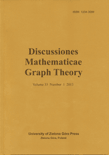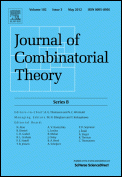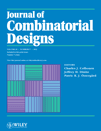
Australasian Journal of Combinatorics
metrics 2024
Fostering Insights in Discrete Mathematics
Introduction
The Australasian Journal of Combinatorics, published by the CENTRE DISCRETE MATHEMATICS & COMPUTING, serves as a vital platform for researchers and professionals engaged in the dynamic field of discrete mathematics and combinatorics. With an ISSN of 2202-3518 and an E-ISSN of the same, this journal has been committed to open access since 2014, ensuring that groundbreaking research is readily available to a global audience. Based in Australia, specifically at the Department of Mathematics, University of Queensland, this journal spans the years from 1996 to 2024, showcasing the evolution of combinatorial research over nearly three decades. Recognized in the 2023 category quartiles as Q3 in Discrete Mathematics and Combinatorics, it ranks 68th out of 92 in Scopus, reflecting its growing influence despite its current percentile of 26th. The Australasian Journal of Combinatorics is dedicated to fostering innovative research and theoretical development, making it a valuable resource for academics and students alike.
Metrics 2024
 0.36
0.36 0.40
0.40 0.40
0.40 34
34Metrics History
Rank 2024
Scopus
IF (Web Of Science)
JCI (Web Of Science)
Quartile History
Similar Journals

Aequationes Mathematicae
Pioneering Research in the Heart of Mathematical Innovation.Aequationes Mathematicae is a distinguished academic journal published by SPRINGER BASEL AG, focusing on the dynamic fields of Applied Mathematics, Discrete Mathematics, and Combinatorics. Since its inception in 1968, the journal has served as a vital platform for disseminating high-quality research, with Converged Years expected to extend to 2024. With an impressive Q2 ranking in multiple mathematical disciplines as of 2023, Aequationes Mathematicae is positioned within the top half of its field, reflecting its reputation for excellence. Spanning the globe from its base in Basel, Switzerland, this journal is ideal for researchers, professionals, and students seeking to advance their knowledge and contribute to ongoing discussions within mathematics. While it does not currently offer Open Access options, readers can still access an extensive archive of impactful studies that bolster its standing within the academic community.

Journal of Combinatorics
Advancing the Frontiers of Combinatorial ResearchJournal of Combinatorics is a premier academic journal dedicated to advancing the field of combinatorial theory and its applications. Published by INT PRESS BOSTON, INC, it aims to provide a robust platform for researchers, professionals, and students to disseminate their findings and engage with cutting-edge developments in combinatorics. With a focus on high-quality, peer-reviewed articles, the journal fosters rigorous mathematical discussions surrounding various facets of combinatorial structures, graph theory, design theory, and combinatorial optimization. Although currently not available as an Open Access journal, the Journal of Combinatorics plays a vital role in enriching the mathematical sciences and serves as an essential resource for academics seeking to stay updated with the latest trends in combinatorial research. By maintaining a commitment to excellence and innovation, this journal is indispensable for anyone looking to deepen their understanding in this critical area of study.

Journal of the Ramanujan Mathematical Society
Championing Innovation in Mathematical InquiryJournal of the Ramanujan Mathematical Society, published by the esteemed Ramanujan Mathematical Society, serves as a vital resource for researchers and professionals in the field of mathematics. With an ISSN of 0970-1249 and an E-ISSN of 2320-3110, this journal specializes in disseminating high-quality research and advancements in various domains of mathematics, particularly those that echo the legacy of the renowned mathematician Srinivasa Ramanujan. Since its inception in 2006, this journal has evolved to embrace a diverse range of mathematical topics, striving for excellence as evidenced by its current Q3 ranking in the mathematics (miscellaneous) category for 2023. Although it is not an open-access journal, the Journal of the Ramanujan Mathematical Society remains a cornerstone for those engaged in the academic study of mathematics, as it appears in Scopus with a rank of #343/399. As it continues its publication journey towards 2024, the journal aims to foster a vibrant community of scholars and practitioners who contribute to the evolving landscape of mathematical research.

DISCRETE MATHEMATICS
Navigating the landscape of theoretical computer science.DISCRETE MATHEMATICS, published by Elsevier, is a leading journal dedicated to the field of discrete mathematics and combinatorics, with a distinguished presence in the academic community since its inception in 1971. With an ISSN of 0012-365X and an E-ISSN of 1872-681X, this esteemed journal has firmly established itself within the Q1 category for Discrete Mathematics and Combinatorics, and Q2 for Theoretical Computer Science as per the 2023 metrics, underscoring its pivotal role in advancing research in these vital areas. DISCRETE MATHEMATICS is highly regarded, reflected in its Scopus rankings, where it stands at #44 out of 92 in its primary category, contributing significantly to the global discourse on complex mathematical theories and applications. Published from the Netherlands, the journal serves as a crucial resource for researchers, professionals, and students looking to stay informed about the latest innovations and methodologies in discrete mathematics. Though currently not an open-access journal, DISCRETE MATHEMATICS continues to foster a vibrant scholarly community through rigorous peer-reviewed research, promoting a deeper understanding of the mathematical structures that underpin both theoretical and applied science.

Armenian Journal of Mathematics
Cultivating Knowledge in the Heart of MathematicsArmenian Journal of Mathematics is a premier open-access publication dedicated to the dissemination of research in the field of mathematics. Published by the National Academy of Sciences of the Republic of Armenia, this journal has been a significant platform since its inception, freely accessible to readers since 2008. It aims to foster scholarly communication by providing a forum for innovative research, particularly in general mathematics and its miscellaneous applications. As of 2023, the journal is ranked in the fourth quartile of mathematics journals according to Scopus metrics, reflecting its growing presence in the academic community. Although the H-index and specific scope details are currently unavailable, the journal's commitment to promoting high-quality mathematic discourse supports the development of the mathematical sciences within Armenia and beyond. We invite researchers, professionals, and students to explore the Armenian Journal of Mathematics for valuable insights and contributions that advance the understanding of mathematical theories and applications.

JOURNAL OF ALGEBRAIC COMBINATORICS
Pioneering insights at the intersection of algebra and combinatorics.JOURNAL OF ALGEBRAIC COMBINATORICS, published by SPRINGER, stands as a premier resource in the fields of algebra and combinatorics, playing a pivotal role in advancing research in these disciplines. With an esteemed impact factor reflective of its academic rigor, it holds a prestigious Q1 ranking in both Algebra and Number Theory, as well as in Discrete Mathematics and Combinatorics, according to 2023 assessments. Established in 1992, this journal features contributions from leading experts worldwide, offering insights into the latest developments and methodologies. Although not an open-access journal, it provides a wealth of valuable information and research findings focusing on combinatorial structures, theory, and applications that are essential for advancing academic inquiry. As a vital publication for researchers, professionals, and students alike, JOURNAL OF ALGEBRAIC COMBINATORICS continues to shape the conversation within the mathematical community and beyond, making it indispensable for those engaged in the dynamic landscape of mathematical sciences.

Discussiones Mathematicae Graph Theory
Charting New Paths in Mathematical ExplorationDiscussiones Mathematicae Graph Theory is a prestigious peer-reviewed journal published by UNIV ZIELONA GORA, specializing in the dynamic fields of Graph Theory, Discrete Mathematics, and Applied Mathematics. With an ISSN of 1234-3099 and an E-ISSN of 2083-5892, this Open Access journal has been providing unrestricted access to its content since 2013, promoting widespread dissemination and engagement in academic research. Established in 2009 and continuing its influential publication through 2024, Discussiones Mathematicae Graph Theory is committed to fostering collaborations and innovations among researchers, professionals, and students alike. Its impressive category quartiles for 2023 show it ranks within the Q3 range for both Applied Mathematics and Discrete Mathematics and Combinatorics, as well as good positions within the Scopus rankings, ensuring its critical relevance in the mathematical community. By continuously highlighting groundbreaking research in graph theory, this journal stands as a vital resource for anyone looking to advance their knowledge and contribute to the evolving landscape of mathematics.

JOURNAL OF COMBINATORIAL THEORY SERIES B
Driving the Evolution of Computational TheoryJOURNAL OF COMBINATORIAL THEORY SERIES B, published by Academic Press Inc., Elsevier Science, is an esteemed journal within the discipline of combinatorial theory, discrete mathematics, and theoretical computer science. With a rich history since its inception in 1971 and ongoing publication through 2025, this journal has established itself as a pillar in its field, currently holding Q1 category rankings in multiple areas including Computational Theory and Mathematics, Discrete Mathematics and Combinatorics, and Theoretical Computer Science. The journal features cutting-edge research and developments, attracting contributions from both established professionals and emerging scholars. Despite the absence of an open access option, the journal's strong impact reflected in its Scopus ranks—such as being number 16 out of 92 in Discrete Mathematics and Combinatorics (83rd percentile)—signifies its influential role in advancing knowledge and innovation. Researchers seeking to share impactful findings and connect with a vibrant academic community will find the JOURNAL OF COMBINATORIAL THEORY SERIES B an essential resource.

Journal of Integer Sequences
Exploring the Infinite: Unraveling the Mysteries of Integer SequencesJournal of Integer Sequences, published by University of Waterloo, stands as a vital resource within the field of Discrete Mathematics and Combinatorics. This open-access journal, which has been in circulation since 1998, is dedicated to the study and dissemination of research concerning integer sequences, a fundamental aspect in various mathematical disciplines. With a current impact factor reflected by its Q3 ranking in the 2023 category of Discrete Mathematics and Combinatorics, the journal enhances its visibility through a dedicated approach to scholarly excellence and engagement with cutting-edge research. Positioned in Canada, the journal encourages contributions from researchers, professionals, and students alike, fostering a collaborative environment where innovative mathematical ideas can flourish. Explore the depths of integer sequences and their applications by accessing this journal for vital insights and advancements in the field.

JOURNAL OF COMBINATORIAL DESIGNS
Elevating the Study of Combinatorial DesignsJOURNAL OF COMBINATORIAL DESIGNS, published by Wiley, is a leading peer-reviewed journal that serves as a vital platform for researchers in the field of discrete mathematics and combinatorics. With an impressive Q1 ranking in the 2023 category, it stands at the forefront of academic discourse, showcasing significant developments and innovative research from 1993 to 2024. The journal is dedicated to the study of combinatorial designs, including their applications in various scientific disciplines, which enhances its relevance among mathematicians and applied scientists alike. Although it operates on a traditional subscription model, the journal continues to attract high-quality submissions, as evidenced by its Scopus rank of #40 out of 92 in Discrete Mathematics and Combinatorics, placing it in the 57th percentile. Its commitment to advancing knowledge in combinatorial theory and applications makes it an essential resource for professionals, researchers, and students seeking to deepen their understanding and contribute to this dynamic field.